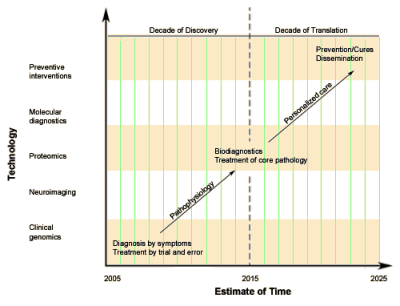PsychiatricNews AlertMarch 5, 2014National Institute of Mental Healthby Nitin Gogtay, M.D., and Tom Insel, M.D.February 27, 2014Director’s Blog: NIMHby Tom Insel M.D.February 27, 2014NIMH has been in the spotlight lately for proposing the Research Domain Criteria or RDoC, a new framework for classifying mental disorders. One of the aims of RDoC is to help refocus clinical research, aligning it with what we are learning from biological, cognitive, and social science. This week, we are taking the first step in an initiative that, like RDoC, aims to realign research—but this time, the target is treatment development, an area in which progress has been frustratingly slow. In a series of funding announcements released this week, NIMH is making three important changes to how we will fund clinical trials.
First, future trials will follow an experimental medicine approach in which interventions serve not only as potential treatments, but as probes to generate information about the mechanisms underlying a disorder. Trial proposals will need to identify a target or mediator; a positive result will require not only that an intervention ameliorated a symptom, but that it had a demonstrable effect on a target, such as a neural pathway implicated in the disorder or a key cognitive operation. While experimental medicine has become an accepted approach for drug development, we believe it is equally important for the development of psychosocial treatments. It offers us a way to understand the mechanisms by which these treatments are leading to clinical change. Moreover, a subset of the funding announcements will support clinical trials that evaluate the effectiveness or increase the clinical impact of pharmacological, somatic, psychosocial, rehabilitative, and combination interventions.
Second, future trials will need to meet new standards for efficiency, transparency, and reporting. In an accompanying article, Changing NIMH Clinical Trials: Efficiency, Transparency, and Reporting, Nitin Gogtay, NIMH Associate Director for Clinical Research, and I review the clinical trials portfolio at NIMH for each of these measures. Recent performance in our clinical trials program is not acceptable: recruitment is too slow, registration in public databases is not consistent, and reporting takes too long to meet the needs of the public for better treatments. To respond to the public concern that “time matters,” we will be establishing new requirements for timelines, trial registration, publication, and data sharing.
Third, to ensure that these new requirements become the norm and not the exception, we will not support new clinical trials under past funding announcements. We will complete the current clinical trials in our portfolio, but new trials will be reviewed according to these new criteria, which include target engagement and new performance metrics…

Why these changes to our clinical trials enterprise? Treatment development has stalled. The pharmaceutical industry pipeline for medications is depleted, after several decades of “me too” drugs. For anxiety, mood disorders, and psychosis, there are few viable new targets because of an inadequate understanding of the biology of the disorders. For autism, anorexia nervosa, post-traumatic stress disorder, and the cognitive deficits of schizophrenia, we lack effective medications. Psychosocial interventions have seen more innovation in the past decade with successful new treatments for anorexia nervosa and borderline personality disorder, as well as broader application of cognitive behavior therapy. But these treatments may not be disseminated or reimbursed in the new healthcare environment without evidence for the required dose and duration of treatment, necessary information for developing measures of fidelity to a validated treatment model. Neuromodulatory treatments, such as brain stimulation, have seen the most innovation but will need considerably more rigor in terms of establishing mechanisms of action and required dose.
In the past, NIMH has supported early phase treatment development, with industry mounting the large-scale trials required for FDA approval. This approach was successful for generating new compounds but not for developing more effective treatments. Over the past decade, NIMH has supported large-scale, expensive effectiveness trials, such as CATIE and STAR*D. These trials were useful for identifying the limits of current treatments, but not helpful for improving outcomes. In the current climate, with funding tight and clinical needs urgent, we will be shifting to trials that focus on targets as a way of defining the next generation of treatments. The goal is better outcomes, measured as improved real-world functioning as well as reduced symptoms.We believe that better outcomes will require a deeper understanding of the disorders. These new clinical trials are designed to provide that…
 Tom Insel stepped from his training into the intramural program at the NIMH where he spent a decade and a half doing research on SSRIs and the effect of hormones on behavior. In the early 90s, he moved to direct the Yerkes Primate lab and later a Translational Research program, both in the Department chaired by Dr. Charlie Nemeroff. It was the decade of the brain, and Emory/Atlanta was an epicenter for matters brain and drug. That orientation followed him to the NIMH where his directive style and bent towards Clinical Neuroscience has created a cohort of NIMH Grantees that have dutifully followed his direction.
Tom Insel stepped from his training into the intramural program at the NIMH where he spent a decade and a half doing research on SSRIs and the effect of hormones on behavior. In the early 90s, he moved to direct the Yerkes Primate lab and later a Translational Research program, both in the Department chaired by Dr. Charlie Nemeroff. It was the decade of the brain, and Emory/Atlanta was an epicenter for matters brain and drug. That orientation followed him to the NIMH where his directive style and bent towards Clinical Neuroscience has created a cohort of NIMH Grantees that have dutifully followed his direction.
Now, Tom Insel and former NIMH director, Steven Hyman, seem to be looking to lead us out of this current crisis [one that they each had some part in shaping]. Hyman still hopes to lure PHARMA back into the game [hope and hype…]. Insel at least appears to have a dawning awareness that we might need to change something about our directions. But I’m not sure that either understands the state of play well enough to be doing any leading at this point, because they both see the problem as a function of the Exodus of PHARMA.
While I do not dispute that the brain plays an important role in the mediation of cognition and emotion, I no longer understand the preoccupation with the need to know the function in order to help the person. I wonder if this belief arises when someone is so removed from clinical experience as to have an entirely idealized perspective regarding the benefits of conceptualizing psychiatry as clinical neuroscience.
One of the best books I have read in recent years is Nobel prize winner, Daniel Kahnemann’s “Thinking, fast and slow”. He describes the elegant research he and his colleagues did – most of which did not require a scanner – to study human cognition.
More of my wonderings are in this post:
http://www.madinamerica.com/2013/05/does-neuroscience-matter/
several
bureaucratic humble pie…an acknowledgement that promises have not been delivered
a marker…..we have to recognize that pharma is not coming back…suddenly things are become different…(even though we all knew we were part of a last hurrah!)
a new healthcare environment…..outcomes are more important…they have
to taken into account
a new participant in clinical research (or a new pecking order in healthcare)…”use of large health care systems, often outside of academic medical centers”
i searched a little to see what kind of talk was going on about the new approach to clinical trials but you were the only voice I encountered…
it’s not new as much as it is a revival of some clinical neurophysiological ideas.
a lot of their work is lost in the archives or untranslated, but i also suspect the US military has been using these methods for unethical practices:
QUANTITATIVE DETERMINATION OF REGIONAL CEREBRAL BLOOD-FLOW IN MAN (1961)
http://dx.doi.org/10.1016/S0140-6736(61)91092-3
DISTRIBUTION OF CEREBRAL ACTIVITY IN CHRONIC SCHIZOPHRENIA (1974)
http://dx.doi.org/10.1016/S0140-6736(74)90221-9